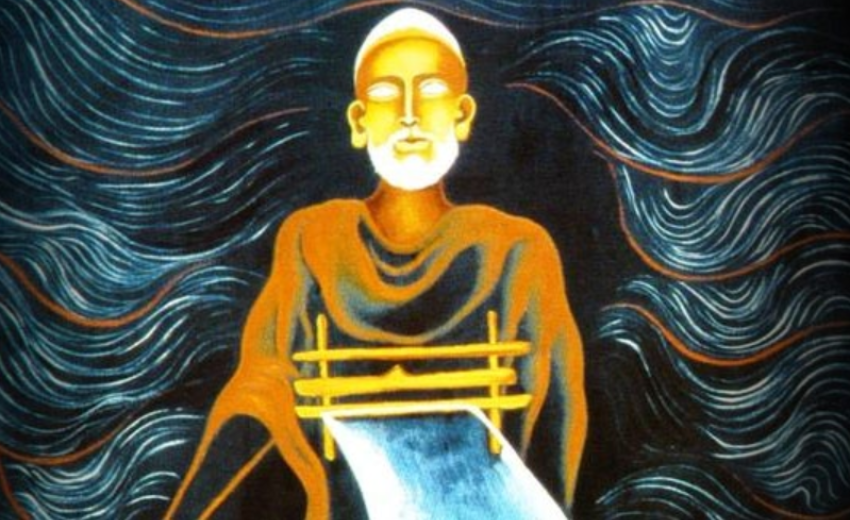FIVE SANTS IN GURBANI
The word sant (a saint or sadhu) appears several times in Guru Granth Sahib. Who does it refer to in Gurbani? In this missive, we will try to explore the meaning and message of the term sant in Gurbani.
FIRST, the Divine
Occasionally, the word sant in Gurbani (in its singular form) refers to the Almighty, the highest Sant that the human mind can envision.
The Creator alone is our true friend, adviser, well-wisher and benefactor. We can open our hearts to Him every day. He never gets annoyed or estranged from us. He knows the state of our mind and never shows indifference to our feelings.
He is truly the most stable and powerful Sant that we can depend upon. With the guidance of Gurbani, we can reach out to Him and enjoy the higher levels of self-reliance and spiritual enrichment:
ਸਤਿਗੁਰਿ ਸੰਤੁ ਮਿਲਾਇਆ ਮਸਤਕਿ ਧਰਿ ਕੈ ਹਥੁ ॥
ਵਡਾ ਸਾਹਿਬੁ ਗੁਰੂ ਮਿਲਾਇਆ ਜਿਨਿ ਤਾਰਿਆ ਸਗਲ ਜਗਤੁ ॥
By placing the hand (of divine grace) on my head, the Satguru has united me with the Sant, the Divine. The Guru has united me with the greatest Master, who saves the whole world. -Guru Arjan Sahib, GGS, 958
Another quote:
ਭਾਗੁ ਹੋਆ ਗੁਰਿ ਸੰਤੁ ਮਿਲਾਇਆ ॥ ਪ੍ਰਭੁ ਅਬਿਨਾਸੀ ਘਰ ਮਹਿ ਪਾਇਆ ॥
I am fortunate; the Guru has united me with the Sant, the Divine. I have found the eternal Being within my home-heart. -Guru Arjan Sahib, GGS, 96
SECOND, the Gurus
Sometimes, the word sant (singular as well as plural) refers to the Guru. The Sikh Gurus use it for their predecessors as in the quote above.
Certainly, the Gurus are perfect examples of ideal sants in human form. After the Almighty Creator, the Gurus are those sants that we can fully trust and seek wisdom from.
Cherishing love and devotion to their teachings is the best way to find spiritual strength, stability and satisfaction in this age of uncertainty, strife and dissatisfaction:
ਹਉ ਘੋਲੀ ਜੀਉ ਘੋਲਿ ਘੁਮਾਈ ਗੁਰ ਦਰਸਨ ਸੰਤ ਪਿਆਰੇ ਜੀਉ ॥੧॥ ਰਹਾਉ ॥
I sacrifice or humble myself to the blessed darshan of the loving Sant, the Guru. -Guru Arjan Sahib, GGS, 96
Another quote:
ਸੰਤ ਕਾ ਮਾਰਗੁ ਧਰਮ ਕੀ ਪਉੜੀ ਕੋ ਵਡਭਾਗੀ ਪਾਏ ॥
The way of the sant, the Guru, is the ladder of dharma. However, only a fortunate one finds it. -Guru Arjan Sahib, GGS, 622
THIRD, the Bhagats
At times, the word sant (singular) may occur for a devotee or servant of God as in today’s quote. Here, it refers to Bhagat Kabir as an avid devotee of the Divine.
Thus, besides the Divine and the Gurus, all Bhagats or other contributors in Guru Granth Sahib are sants. They were the people who realised the true purpose and meaning of life. They acquired virtues of the Divine in their lives. Through their quest for the Divine, they practised and preached higher values of truth, wisdom, kindness and love for all. They recognized the Creator in the creation.
For example, Sant Kabir:
ਕਿਆ ਅਪਰਾਧੁ ਸੰਤ ਹੈ ਕੀਨ੍ਹ੍ਹਾ ॥ ਬਾਂਧਿ ਪੋਟ ਕੁੰਚਰ ਕਉ ਦੀਨ੍ਹ੍ਹਾ ॥
What wrongdoing has this sant committed, that you have made him into a bundle and thrown before the elephant? -Bhagat Kabir, GGS, 870
The verse above refers to an incident when the ruler of the time ordered his officials to tie Bhagat Kabir and put him before an elephant, to be trampled to death. However, the elephant didn’t move forward even after repeated prompting by the mahout.
Another quote referring to Bhagat Prahlad as a sant:
ਸੰਤ ਪ੍ਰਹਲਾਦ ਕੀ ਪੈਜ ਜਿਨਿ ਰਾਖੀ ਹਰਨਾਖਸੁ ਨਖ ਬਿਦਰਿਓ ॥੩॥
(The Divine is the source of all peace) who preserved the honour of the sant Prahlad, and destroyed Harnakhash with his nails. -Bhagat Kabir, GGS, 856
FOURTH, the devotees or seekers of truth
Mostly, the word sant (often in plural) is used for devotees or seekers on the path of a spiritual journey, as in the quote above.
The contributors of Guru Granth Sahib often address the seekers of truth in reverential terms as sants or sadhus. They show humility and reverence while referring to such seekers who practise and internalise divine teachings in their lives. It is in the company of these experienced wise disciples of the Guru that we are able to partake in the wisdom of the Divine easily and find lasting peace, satisfaction and fulfillment:
ਉਨ ਸੰਤਨ ਕੈ ਮੇਰਾ ਮਨੁ ਕੁਰਬਾਨੇ ॥ ਜਿਨ ਤੂੰ ਜਾਤਾ ਜੋ ਤੁਧੁ ਮਨਿ ਭਾਨੇ ॥
(O Divine!) My mind humbles itself to those sants who have recognised You, and who are pleasing to Your mind. -Guru Arjan Sahib, GGS, 100
Another quote, where Guru Ram Das wishes to humble himself to such sants:
ਜਿਨ੍ਹ੍ਹ ਕੈ ਹੀਅਰੈ ਬਸਿਓ ਮੇਰਾ ਸਤਿਗੁਰੁ ਤੇ ਸੰਤ ਭਲੇ ਭਲ ਭਾਂਤਿ ॥
ਤਿਨ੍ਹ੍ਹ ਦੇਖੇ ਮੇਰਾ ਮਨੁ ਬਿਗਸੈ ਹਉ ਤਿਨ ਕੈ ਸਦ ਬਲਿ ਜਾਂਤ ॥੧॥
Those sants or devotees in whose hearts my Satguru dwells are good and noble in every way. Seeing them, my mind blossoms forth in bliss; I humble myself to them at all times. -Guru Ram Das, GGS, 1264
Etymologically also the word sant derives from Sanskrit sat (real, true, good; one who knows the Truth, the Ultimate Reality). The author of Mahan-kosh has speculated about its derivation from the Sanskrit word shaaṅt (one who has calmed or controlled one’s mind and senses, unperturbed). Further, its resemblance to the English ‘saint’ is illusory, because its root is Latin sanctus (holy, holy hymn). You can read more about it here.
FIFTH, the thugs in the forms of sants
Not all those who appear to be saintly in their outward show are saintly or good in actual life. Hence, sometimes, the word sant might be used satirically for such people, who call themselves sants or add it to their names as a title or desire to be called so by others but lead a life of hypocrites.
Gurbani critiques such people because it is discriminatory if someone assumes that he or she is superior to others. It is anti-thesis to the control of egoism and self-realisation. Hence, calling oneself higher than others is not spiritually wise or sanctioned.
Call them not sants but crooks!
ਐਸੇ ਸੰਤ ਨ ਮੋ ਕਉ ਭਾਵਹਿ ॥ ਡਾਲਾ ਸਿਉ ਪੇਡਾ ਗਟਕਾਵਹਿ ॥੧॥ ਰਹਾਉ ॥
Such sants or thugs are not pleasing to me who gulp the tree along with its branches. -Bhagat Kabir, GGS, 476
Another example referring to hypocrites:
ਹਿਰਦੈ ਜਿਨ੍ਹ੍ਹ ਕੈ ਕਪਟੁ ਵਸੈ ਬਾਹਰਹੁ ਸੰਤ ਕਹਾਹਿ ॥
ਤ੍ਰਿਸਨਾ ਮੂਲਿ ਨ ਚੁਕਈ ਅੰਤਿ ਗਏ ਪਛੁਤਾਹਿ ॥੨॥
Whose hearts are filled with hypocrisy and who call themselves sants outwardly - their material cravings are never satisfied, they depart regretting in the end. -Guru Amar Das, GGS, 491
It may be worth noting that hundreds of outfits and their off-shoots exist in rural areas in Punjab and elsewhere in India who proclaim to be sants or babas.
Further, it might be of interest to note that hardly any Sikh used the word sant for himself before the beginning of the twentieth century. In the Gurus’ period and later on, the most revered term for males in Sikh tradition was “Bhai” (brother or colleague): Bhai Mardana, Bhai Gurdas, Bhai Mati Das, Bhai Mani Singh, Bhai Maharaj Singh, etc.
In conclusion, we can say that besides the Almighty Divine, the Gurus and the Bhagats, the word sant is used loosely to denote anyone who is close to the Divine and the teachings of the Guru. The Gurus were against new rituals and traditions springing and confusing people. Thus they never did sanction any tradition like sainthood, neither any initiation to be a sant. They knew such practices would delude the masses.
The article has been extracted from an issue of AWAT. Those who wish to receive the Gurbani Word of the Day from AWAT can register here: http://awordathought.com/
Compiled and edited for the SikhNet by
Dr Jaswant Singh
Team AWAT





